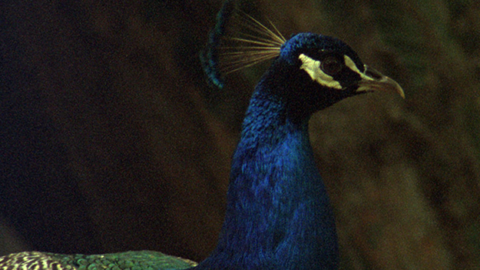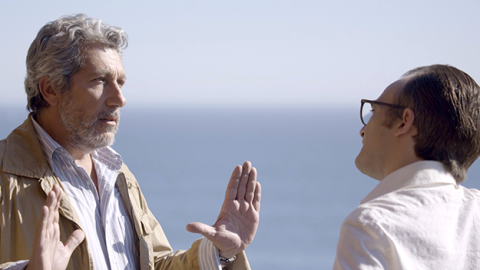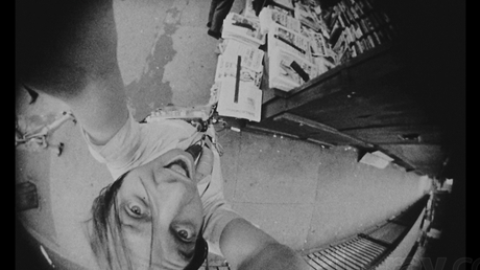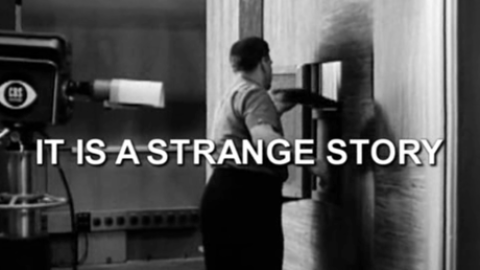Interview: Nëil Beloufa
“It’s really adopting the shit,” says Nëil Beloufa, less than a minute into our introductory exchange about his latest film, People’s Palace, as if to deflect any sort of deep reading into a movie that pillages perhaps the guiltiest of all guilty pleasures: reality television. Known largely for his sculpture-based gallery installations, the French-Algerian visual artist, whose corresponding video work has often featured an element of nonfiction, has in recent years taken to more narrative-driven cinema. His breakthrough feature, Occidental (2017), a seductively stylized foray into “normal” filmmaking, found Beloufa skillfully exploiting a modest budget and professional actors to frame an allegorical tale of sociopolitical unrest in and around a boho Parisian hotel. With People’s Palace, Beloufa splits the difference, staging a Big Brother-like reality TV competition with nonprofessional actors in Iran, where popular entertainment is subject to intense censorship. Shot on lo-res video, the film resembles an unearthed artifact from the mid-2000s reality show boom. (Curiously familiar voiceover interjections places the action distinctly in the Obama era.) With an ominous, all-seeing eye in the sky, a mixed-gender cast engaged in any number of interpersonal rivalries, and the unseen but palpable political turmoil transpiring just outside the frame, it’s little wonder that the game soon devolves into violence and bloodshed––but not without a little song and dance and dress up along the way.
Following the premiere of People’s Palace at the 2018 Geneva Biennale of Moving Images, where it’s screening daily until February 3 under the working title Restored Communication, Beloufa sat down to discuss his early resistance to filmmaking, working with an inherently political form of popular entertainment, and his evolving conception of art and filmmaking as tools for social change.
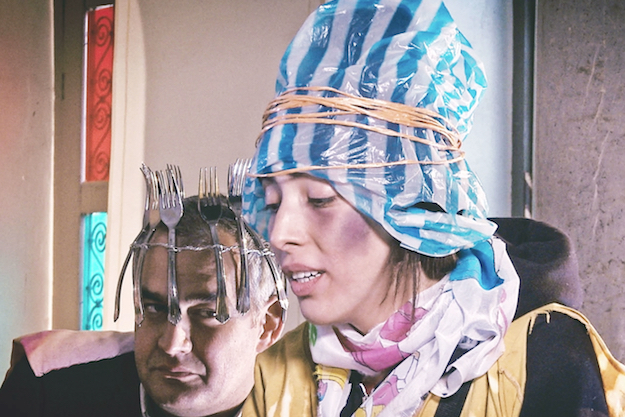
Recently you said that when you started out you were sure you didn’t want to make films, and then accidentally fell into doing just that. Can you elaborate?
I’m the second generation [of my family] to have access to this culture. My dad was a Marxist filmmaker in Algeria––his films got burned and he never made a film after the ’70s. So it’s a personal thing where I’m scared of systems. I knew films growing up but I didn’t like films––it was a weird relationship. But when I was making those statements in interviews, I think maybe I meant the opposite, that I hoped to make films but didn’t think I would.
People’s Palace was ultimately invited to participate in the Biennale, but was it something you had been working on prior to the commission?
Yes, I had already gone to Iran and shot it, but I didn’t really know what I had shot. I did a big exhibition there and didn’t include it. I do that all the time. I like to experiment with projects while in the middle of something else. We were in Iran and I asked [our Iranian funders] if I could make a film. So we did, in an eight-day window. And then when the Biennale curators asked if I’d be interested in participating in the show I mentioned this film that I shot but never finished. So they financed the completion.
I imagine this means you constantly have work in various stages of production.
Yes, this is the 25th film. I have a lot of shit. I work with quantity not quality. [Laughs]
That’s interesting since a lot of critics referred to Occidental as either your first or second film. I guess because it was more…
Normal…
Yeah, normal, or narrative driven. It was also feature-length, although so is People’s Palace.
Yes, but this one also isn’t normal. Occidental is still more the first. But it’s ok, because this way the next one can also be the first. [Laughs]
I guess Occidental was more professional, with working actors and a real budget. It was made to be shown theatrically.
It has a cinematic quality. For this one I was kind of stupid: instead of doing something that was 10 or 20 minutes long, I just kept shooting. I didn’t have a DP.
You shot it yourself?
My first assistant did. We had two shitty cameras and, just, I don’t know [makes fart noise with mouth]. We just took those cheap cameras and decided to try something. I like that idea. But then when you need to actually get down and do it, it’s like fuuuck.
I’m curious about your relationship with reality TV. Is it something you’ve been interested in for a while? Where did the idea come from to frame the film as a reality TV show?
I’m interested in society and how society represents itself, and reality TV is a sign of the times. When a country starts to open itself up, that’s when reality TV arrives––that’s one of the markers of the openness of a country. So it felt accurate. This was at the end of the Obama administration. Iran didn’t have reality TV. I was an artist coming from New York, where I was at the time, so it felt like I was the one bringing reality TV and contemporary art to this part of the world.
Reality TV interests me because it’s a Catholic structure in a Protestant world. There’s something ideologically in it that’s really strange. And it’s also a super political form, because you lock people who disagree with each other in the same space, and then they’re forced to confess things. It felt like the perfect image of the media-ization of recent Iran history to the West. So it’s an image of my position and an image of my representation of the country. You know Trump’s recent [Game of Thrones-inspired] tweet about how “sanctions are coming”? It was these types of relationships that interested me.
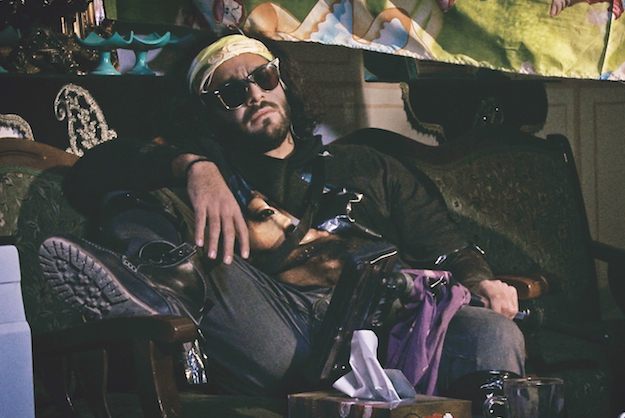
You mentioned in your introduction to the film that you shot between elections?
Yes, during the presidential campaigns. By the time I went to the opening of our show in Iran it was when Trump had ordered the travel ban.
By this point I imagine the Obama-like voiceover was already in place?
Yes, Obama was always part of the project. But at one point, after the election, I did wonder if I should reevaluate. But it felt nice to me to bring a bit of nostalgia to the critique.
Were there any specific reality TV shows that you watched or that you tried to model the film after?
Not really. I mean, of course I knew the structure of Big Brother and shows like this. But the idea was a simple one, and we shot super fast. It feels weird because there was a moment years prior where I was looking at a lot of reality TV, but not before shooting this film. So I forgot many things, and just ended up improvising.
Who are the actors?
Locals. Friends of the people who invited me out there. Just normal people. One of them had acting experience, and another did theater in high school or something. But I just took them as profiles of society in Iran.
Did you discuss their conceptions of realty TV at all? Were they familiar with American television, or did you have to explain to them what it was you were lampooning?
A bit. There was a funny distance. Some of them were familiar with reality TV, but most of them are not travelers. It’s like they knew, but they didn’t really know.
Do you think the process of making Occidental has informed your filmmaking at all?
I don’t know––not really. I try to always switch systems of shooting. Right now I’m shooting something that’s super serious. This film is super distant––it’s more like a game, to see if I put something in if something will come out. For my new film I’m doing interviews with soldiers on Skype from all around the world––men and boys, very young. It’ll be more poetic, like some of my earlier nonfiction work.
That’s one of the things I found interesting about this film, actually. Like reality TV, it’s kind of a fake document.
Yes, it approaches the breaking point, which may be why I’m not comfortable with it.
Your recent films seem to show an interest in closed communities. Both Occidental and People’s Palace take place in confined settings. They’re like microcosms of very specific sub-societies or time periods.
I was editing Occidental as I was shooting People’s Palace, and I was frustrated––I thought I should have been able to make Occidental in five days. I was pissed off because of the time and money and effort.
How long did it take to shoot Occidental?
Twenty-two days. But the preparation, the sets, the edit––everything took work. I don’t have financiers. I just recently finished paying off my debts from Occidental. So for this film that’s why I was like, okay, maybe let’s use shitty cameras and shoot it in eight days. Shooting in one location is easy. You can shoot a lot, and for a small budget.
It’s interesting that the films were made almost simultaneously. They’re structured similarly, and there’s a certain artifice to the productions. Even thematically: there’s violence lurking throughout and both conclude with big, quasi-action set pieces.
They’re the same film. [Laughs]
What was it like working with nonprofessional actors?
It was super nice. But I don’t speak Farsi. I had lines for them, but there was improvisation based on what I was getting translated. I directed the acting a bit without knowing what they were saying.
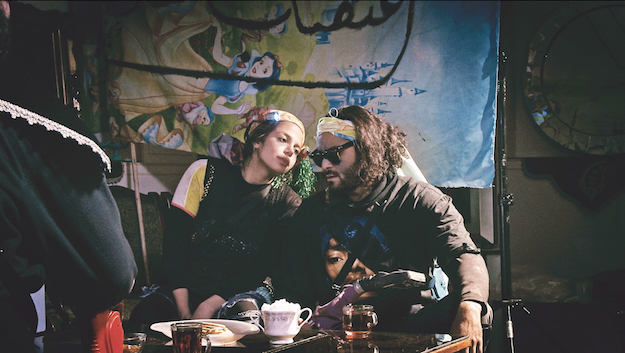
Can you talk a bit about the computerized voice that speaks to the participants on the show, and also about the pop songs that you interpolate in these exchanges?
A friend of mine who helps translate when I write in English came up with that idea. The only debate amongst the crew about that was with the use of the Justin Bieber song. I wanted it to be pop, but in a very simple way. Because I could have made the same film in a super dark, serious way. But that would have felt manipulative. It’s not a heavy project. I like humor. At one point I was thinking of using Obama speeches throughout––making it darker through his words. But the film is already meta-conceptual, so I thought maybe I don’t need to add that layer. Plus the kid who did the Obama voice disappeared. [Laughs] That’s when I decided to go back to the robot, or computer, voice.
I’m assuming the voice is supposed to call to mind 2001: A Space Odyssey?
Totally.
I was also oddly reminded of La Chinoise toward the end of the film as the characters are dressing up and painting their faces for combat.
That wasn’t on purpose but I can see that. What was interesting is that the actors brought references that I don’t even understand. We shot the reality TV scenes first––that was a way to get to know each other. And then after that we made the costumes together, and we talked about the characters: “You’re the businessman,” or “you’re the nice, serious religious man, how would you dress once you achieve power?” So as we were building the characters, everything became a reference to their own history. So if La Chinoise is in there at all it’s because of the political references, which mostly point to the ’70s and ’80s. Stylistically I wanted the film to be a kind of ’80s movie.
What did you shoot on?
A fucking Sony video camera that was high-tech when I was still in school. It’s not HD––it’s just above standard definition. On these types of projects I often use the wrong generation of camera. I had a memory of using this camera during my first year in art school and thinking, “Wow, the image is so beautiful.” And I look now and I’m like, “Fuck, it’s ugly.” [Laughs]
How do you approach-moving image work made for the gallery versus for the cinema?
I mean, this film, it’s not cinema, it’s not art. It’s not in-between. It’s not even TV! I’m interested in understanding why in fields where you can show everything that some things like this don’t work anywhere. Like, this doesn’t work well in any field. It doesn’t play as an independent movie for a festival or as a piece in a contemporary art context. I think it’s my job to find why it doesn’t fit. But then I’m not always happy with the answer. Because I like films. I’m happy I did this film and I understand why, but it’s the first time that instead of having the desire for a certain image or people, here I only had a meta concept of how to position something. So then the film goes against me in a way. I feel like with the world we’re living in now we need a change of strategy. If we keep utilizing the same strategy for how make “good” indie films, and we see the same results, that means there is something wrong. I used to carry this utopian idea that art could have an impact on society. But art has never been that powerful, or that mainstream. So I’ve thought about making films that people who hate art could watch, to break out of my comfort zone. Occidental was a kind of attempt to work this idea out.
I think a cultural reevaluation is going on throughout the world. And I’m too old to create a new utopia. But the strategies of the past created that shit, and it sometimes makes me unable to see art even when I look at art. My goal, then, is to use myself to create a possibility to find a position that makes room for others.
Jordan Cronk is a critic and programmer based in Los Angeles. He runs Acropolis Cinema, a screening series for experimental and undistributed films, and is co-director of the Locarno in Los Angeles film festival.



